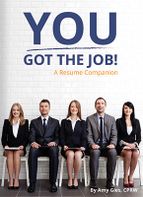Maybe you’re ready for a new challenge or change of pace. Perhaps changes in your industry mean it’s time for retooling. Whatever your reasons for changing careers, you’re probably reading this because you aren’t sure what that means for your resume. Here we share eight tips to guide you in reworking your resume when reworking your career.
Expect To Rewrite It
If you’re changing industries or occupations, it’s unlikely that your current resume will get your foot in the door without changes. The greater the leap, the more changes you can expect to make. You are competing with others who already have specific experience in your new field, so the goal of your career change resume is to help the employer understand how your prior experience is relevant to the new position. Plan for a serious overhaul, if not a complete rewrite, of your resume to accomplish this.
Start With Transferable Skills
Leadership. Communication. Management. Planning. These are just a sampling of skills that are necessary for almost any type of professional position. Surely there are plenty of skills you have developed in your previous positions that can help you succeed in your new career. Identify your strongest skills and bring those that make sense for the new job to the forefront on your new resume.
Focus On Accomplishments
Employers want to know what it is that you can do for them. Demonstrating a successful track record in your previous positions can go a long way in convincing an employer that you can also do well for them. The more specific you are about your accomplishments (i.e. numbers) the better. Highlight any previous accomplishments that are relevant to the new position first.
Keywords Are Key
Your resume is probably full of keywords relevant to your current or prior career. Carefully examine job descriptions for your new field to determine how you can incorporate relevant keywords into your new resume. Relevant keywords will stand out to the hiring manager who reviews your resume and can also help you get through the electronic systems that filter resumes.
Relevant Experience Isn’t Necessarily Paid Job Experience
It’s not so much about how you get the experience, it’s more about having it. And it’s not just paid experience that counts. If you’ve done volunteer work or otherwise gained experience in your new field, be sure to highlight it on your new resume. If you have no experience in your new occupation or industry, it would be helpful to gain specific skills in your spare time that are relevant to the new line of work in you are targeting.
Consider Changing The Format
Most job seekers are used to the standard reverse chronological resume, but there are other resume formats that may be more appropriate for career changers. A functional resume format puts more emphasis on skills than employment history. A hybrid version of this would have a strong career profile at the top, emphasize skills and relevant experience first, and save the reverse chronological work experience for the end or the second page. This hybrid model highlights the relevant information up front while also showing an employer that you do not have employment gaps (if you don’t).
Know What To Leave Out
Your current resume is probably full of specific responsibilities that pertain to the field you are trying to exit. If you have an extensive work history, you don’t have to include great detail for all of your previous responsibilities, especially those which are not applicable in the new field you aspire to enter. Do not fear leaving out irrelevant information. It can clutter your resume and increase the odds that an employer will overlook what you have to offer for the new position.
Connect The Dots
As briefly mentioned above (see tip #1), a hiring manager will probably not automatically make the connection between your prior experience and the new position. It’s important to be clear in your cover letter that you are serious about changing careers and demonstrate on your resume how your skills and prior experience will make you successful in the new position. The more you can help the hiring manager or recruiter make the logical connections, the better your chances of getting an interview.
Affordable resumes, cover letters and LinkedIn profiles created by Capstone Resume Services’ certified resume writers with recruiting and hiring backgrounds get results. Learn more here.

